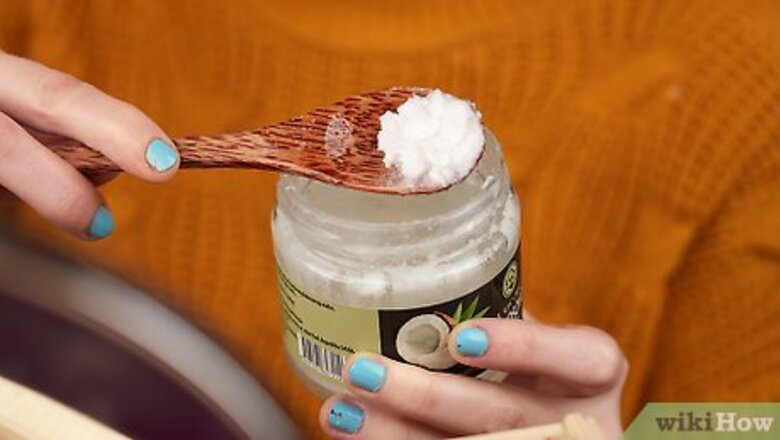
views
Using Natural Products
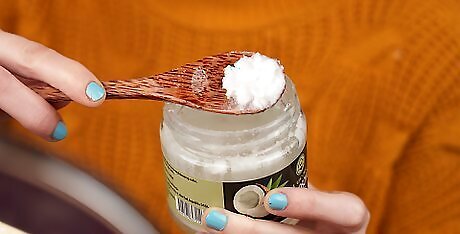
Use a dab of coconut oil. Coconut oil quickly removes regular and waterproof mascara, plus it moisturizes and smooths your skin. Because it is a solid at room temperature, rub a pea-sized scoop between your (clean!) fingertips until it becomes soft and spreadable. You don't need a special coconut oil for your face--use the same coconut oil used as a cooking ingredient. Be aware that if you get any in your eye it can temporarily blur your vision.
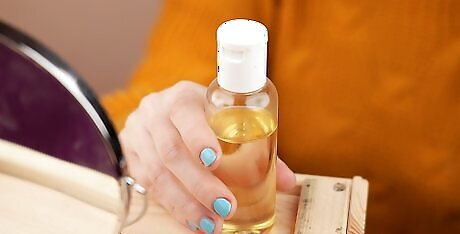
Try jojoba oil if you have sensitive or acne-prone skin. Jojoba is actually liquid plant wax, not oil, and it is very helpful for those prone with oily skin. In addition to being non-comedogenic (meaning it won't clog your pores), it is a non-allergenic and won't irritate your eyes like some oils can. Jojoba can also moisturize the skin around your eyes and condition your lashes.
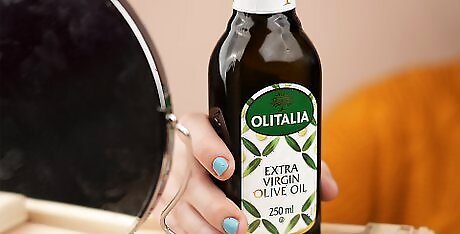
Use olive oil to remove mascara. Olive oil breaks down the mascara on your face. It can also help cleanse the skin around your eyes, moisturize, and remove troublesome makeup.
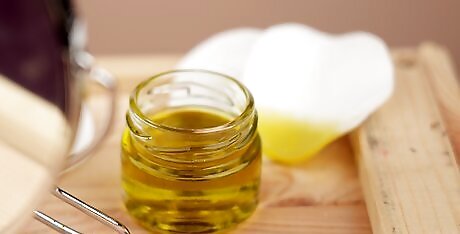
Try avocado oil. It is one of the most moisturizing oils and, like other oils, easily dissolves and cuts through makeup. Look for dark avocado oil in a tinted container, which will preserve the quality of the product. Next time you make guacamole you can even try using avocado oil straight from the fruit! Cut the avocado in half and use a cotton swab to lift the oils from the inside (don't gouge it--you don't want any green stuff on your swab).
Using Commercial Products
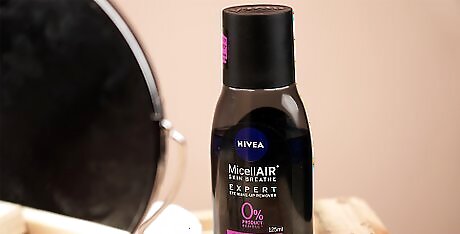
Buy an eye-makeup remover formulated for your skin type. There are tons of options for makeup removers, so try narrowing down the choices by what works best for your skin. If you have oily skin or break out often, look for something oil-free. If you have very sensitive skin, you'll want a gentle, fragrance-free remover. Oil is a necessary ingredient when you're trying to remove waterproof mascara, because it dissolves the oils in the makeup (instead of being repelled, like water). Oil-free makeup remover does exist, but it's not as effective for removing mascara as oil-based makeup removers. Dual-phase cleansers are good for everyday use. These cleansers contain a water-based and oil-based mixture. Simply shake the bottle, saturate a cotton pad, and apply to your face for a gentle, effective cleanser removal. Cleansing water works well on sensitive skin and regular, non-waterproof mascara.
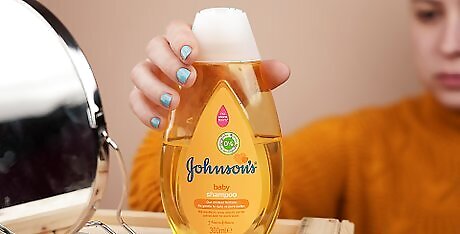
Try baby oil if you run out of your usual cleanser. It's best to stick to an actual eye make up remover, since it's specifically made to be used around your eyes, but baby shampoo is an effective replacement if you run out. Use a chemical and fragrance-free baby shampoo if you can. Many "no tears" formulas actually have a numbing agent, which will only mask the irritating effects.
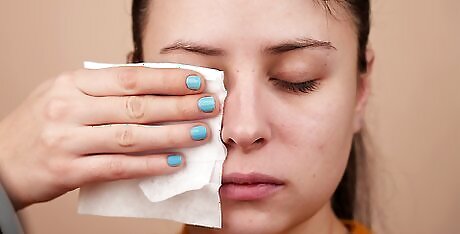
Use a makeup-removing wipe when you just can't make it to the sink. Try not to use these too often, as they can be rough on the thin skin around your eyes. If the wipes are not specifically for eyes, look for a brand that is alcohol-free.
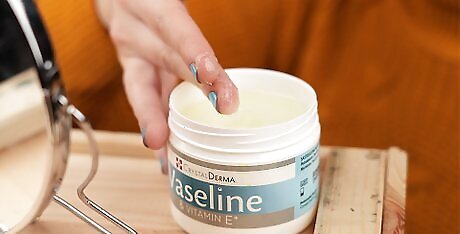
Avoid petroleum jelly (also known as mineral oil), or use very sparingly. Petroleum jelly is a byproduct of gasoline, and unless you know the brand you're using has been thoroughly refined and purified (Vaseline is one such brand), it's not something you want near your eyes. Petroleum jelly does not actively hydrate your skin. If your skin is clean and moisturized it can seal the moisture in and keep it from evaporating, but it is not a replacement for moisturizer itself.
Removing Your Mascara
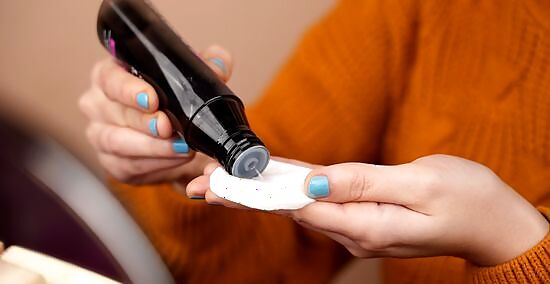
Wet a makeup pad with the makeup remover of your choice. Try not to oversaturate the pad, or the solution may drip on your face. Apply enough makeup remover so that the pad is just saturated. Don't use a cotton ball, as the fibers can detach and get in your eyes. If you're not sure how your skin will react to your makeup remover (whether it's coconut oil or from the drugstore), test some on your inner wrist. If you have a reaction it's better to have an inflamed wrist than an inflamed eye.
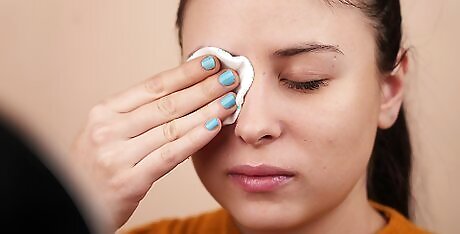
Press the wet side of the pad to your closed eye and hold for 20 seconds. Don't scrub or tug on your skin, just press the pad against your lashes so the remover can begin to break down the makeup. Avoid scrunching your eye, as this can lead to a sloppy removal. Instead, lightly close your eyelid.
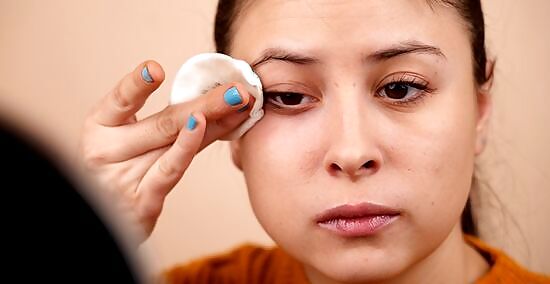
Wipe away the mascara by using gentle, downward swipes. To remove, simply wipe down along the lashes, away from the lid. Once all of the mascara is removed from the top of the lash, place the pad slightly below the lower lash line and close the upper lash firmly on top of it. You can wiggle the pad a little by your lash line to help break up more stubborn mascara. Use cotton swab dipped in makeup remover to clean up any remaining mascara, like little flecks or smears that end up under your lower lashes.
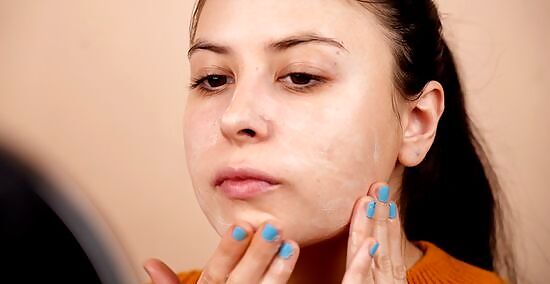
Wash your face with an appropriate cleanser. Removing your makeup is not the final step in your nightly skincare routine--it's the first. Getting all the makeup off your face allows the your cleanser to get into your pores, instead of mixing with makeup and clogging them. Find a cleanser that is right for your skin type and gently massage it into your face. Use warm water and a facial cloth or sponge to wipe off the dirt and grime. Washing your face also removes any remnants of your makeup remover which, if it remains on your skin, can cause dryness or even an allergic reaction.
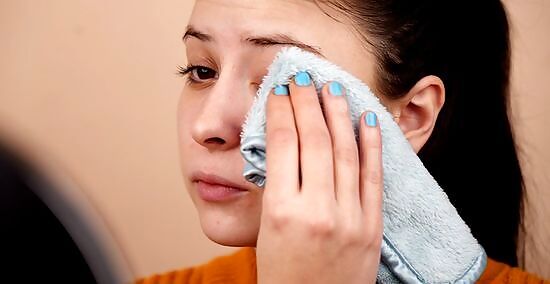
Pat your eyes dry with a soft towel. Be careful to avoid pressing down too hard, simply pat to remove excess moisture.
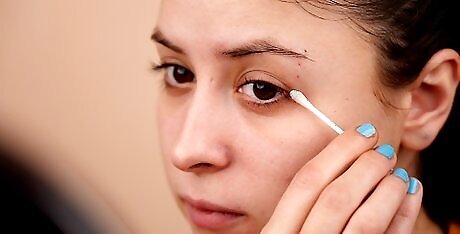
Remove any excess residue with a q-tip and some moisturizer. If you notice any leftover dirt, you can dab at the area with a q-tip instead of reapplying makeup remover. Make sure your moisturizer does not have SPF, which could sting your eyes.




















Comments
0 comment